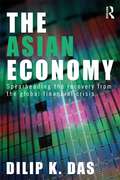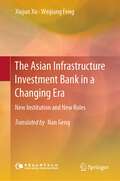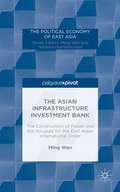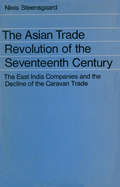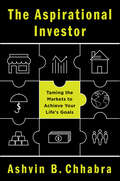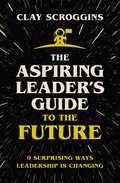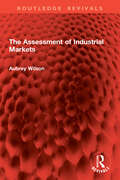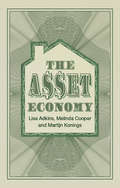- Table View
- List View
The Ashgate Research Companion to International Trade Policy
by Kenneth HeydonThis volume provides a state of the art review of current thinking on the full range of trade policy issues, addressing the economic and political dimensions of international trade policy. The volume contains a systematic examination of: - specific trade policy instruments (such as tariffs, non-tariff barriers and trade rules) - sectoral concerns (in agriculture, manufacturing and services) - trade linkages (to issues such as the environment and labour standards) - systemic considerations (what role for the WTO?) The organising theme of the volume is that open markets for trade and investment yield large potential gains in human welfare as long as trade policy is conducted as an integral part of broader domestic economic management and regulatory reform, and as long as the particular challenges facing developing countries are effectively addressed. This 'case' is presented on the basis of rigorous analysis of first principles and of empirical experience among key trading nations. An integrated set of original and comprehensive perspectives from a diverse group of experts, linked by a common organisational thread. The contributing authors create an ideal mix of internationally recognised experts together with younger specialists making their mark in trade policy analysis; academics as well as trade policy practitioners; and representatives of both developed and developing countries.
The Ashgate Research Companion to Non-State Actors (Non-state Actors In International Law, Politics And Governance Ser.)
by Bob ReinaldaHow do non-state actors matter in international relations? This volume recognizes three types of non-state actor: non-governmental organizations (NGOs), intergovernmental organizations (IGOs) and transnational corporations. It illustrates how they play roles alongside nation-states and are interrelated in matters of international regulation and coordination. After an introductory part on current qualitative and quantitative sources, this comprehensive collection of state-of-the-art essays is comprised of four main thematic parts: Part II examines actors other than governments, such as transnational religious actors, business representatives and experts, and also parliamentarians and agencies set up by IGOs. Part III studies the perceptions and understandings in political philosophy, international law and international relations theory. It questions concepts used (civil society, NGO, governance) and covers the limitations to be kept in mind. Part IV analyses the nature and impact of non-state actors. Chapters discuss processes within international bureaucracies (diplomacy, dynamism, bureaucratic power, contribution to democracy) and the quintessence of deliberation and decision making within NGOs and IGOs and of implementation, accountability and dispute settlement. Part V studies specific worlds of non-state actors: humanitarian aid, human rights, security, the North-South divide, health, trade and environment. Accessible and articulately written, The Ashgate Research Companion to Non-State Actors is aimed at a wide readership of scholars and practitioners in international relations.
The Asia-Pacific Century: Challenges and Opportunities
by Adam B. LowtherWhen Secretary of State Hillary Clinton published "America's Pacific Century" in Foreign Policy magazine in November 2011, the administration was clearly indicating to domestic and international audiences that the United States is beginning a pivot toward the Asia-Pacific. Clinton's article served as a spark for renewed interest in the nation's Asi
The Asian Economy: Contemporary Issues and Challenges
by Kenta Goto Tamaki Endo Asei ItoThe book is a key reading which provides a comprehensive and systematic overview of the contemporary Asian economy. The book focuses on the structural changes that are rapidly transforming the regional economic landscape in the 21st century. It highlights the concomitant challenges that have arisen, and further discusses prospects and potentialities of Asian economies given this new economic environment. The book also looks at broader social issues that are both the cause and result of these new and complex economic dynamism in Asia. Understanding the Asian economy cannot be achieved without understanding the new interrelationships and complexities that have evolved from this context, which continue to be driven by drastic changes in technological, demographic, and social structures, among others. Each of the chapters are titled based on "issues" and are framed in present continuous tense, intended to capture and emphasize the progressiveness of this new dynamism that are transforming the region in a fundamental way.
The Asian Economy: Spearheading the Recovery from the Global Financial Crisis
by Dilip K. DasThe global financial crisis of 2007-09, and the Great Recession that it engendered, were both a challenge and an opportunity for Asia. The region not only remained unharmed by the global financial crisis initially but also recovered the fastest. In addition, it was also the principal driver of the global recovery. This book analyzes the impact of the global financial crisis and the Great Recession on the Asian economy. Chapters look at the most significant issues related to the Asian economy during the crisis, how it coped with them and how it eventually emerged from them. Dilip K. Das discusses how the Asian economy, particularly the emerging-market economies, spearheaded the recovery of the global economy from the global financial crisis and recession, and goes on to look at how this is of historical significance. Written in a clear, comprehensive and critical manner, this book covers the contemporary academic and policy debates on Asia’s role in the world economy. As such, it is an essential read for students, researchers and public policy professionals interested in Asian Economics as well as studies in the International Political Economy.
The Asian Financial Crisis: Origins, Implications and Solutions
by William C. Hunter George G. Kaufman Thomas H. KruegerIn the late 1990s, Korea, Thailand, Indonesia and Malaysia experienced a series of major financial crises evinced by widespread bank insolvencies and currency depreciations, as well as sharp declines in gross domestic production. This sudden disruption of the Asian economic `miracle' astounded many observers around the world, raised questions about the stability of the international financial system and caused widespread fear that this financial crisis would spread to other countries. What has been called the Asian crisis followed a prolonged slump in Japan dating from the early 1980s and came after the Mexican currency crisis in the mid-1990s. Thus, the Asian crisis became a major policy concern at the International Monetary Fund as well as among developed countries whose cooperation in dealing with such financial crises is necessary to maintain the stability and efficiency of global financial markets. This book collects the papers and discussions delivered at an October 1998 Conference co-sponsored by the Federal Reserve Bank of Chicago and the International Monetary Fund to examine the causes, implications and possible solutions to the crises. The conference participants included a broad range of academic, industry, and regulatory experts representing more than thirty countries. Topics discussed included the origin of the individual crises; early warning indicators; the role played by the global financial sector in this crisis; how, given an international safety net, potential risks of moral hazard might contribute to further crises; the lessons for the international financial system to be drawn from the Asian crisis; and what the role of the International Monetary Fund might be in future rescue operations. Because the discussions of these topics include a wide diversity of critical views and opinions, the book offers a particularly rich presentation of current and evolving thinking on the causes and preventions of international banking and monetary crises. The book promises to be one of the timeliest as well as one of the most complete treatments of the Asian financial crisis and its implications for future policymaking.
The Asian Infrastructure Investment Bank in a Changing Era: New Institution and New Roles
by Weijiang Feng Xiujun XuThis book explores the establishment process, mechanism design, and role orientation of the Asian Infrastructure Investment Bank (AIIB) under the new background of global economic governance. After the international financial crisis in 2008, the process of economic globalization and the comparison of international forces have presented a new situation, and the global economic governance system since has entered a period of deep adjustment and transformation. At the same time, the problems and drawbacks of the original multilateral development financial system have become increasingly prominent. This not only provides a historical opportunity for the establishment of the AIIB, but also gives it a new important role in the global multilateral development financial system. The innovation of the AIIB’s governance model, such as organizational structure, equity, and voting rights allocation, makes it more efficient in operation. And in practice, it is playing an increasingly important role in promoting policy connectivity, infrastructure connectivity, trade connectivity, financial connectivity and people-to-people connectivity of Asian region.
The Asian Infrastructure Investment Bank: The Construction Of Power And The Struggle For The East Asian International Order (The\political Economy Of East Asia Ser.)
by Ming WanThis book assesses the strategic significance of the Asian Infrastructure Investment Bank (AIIB) by examining the logic of international power and order, historic trends in East Asian international relations, the AIIB's design in comparison to 'rival' financial institutions such as the World Bank and the Asian Development Bank, recent tendencies in Chinese foreign policy, and the Chinese system of political economy. It focuses on how China 'constructs' international arrangements at a critical juncture in history compared to other great powers, especially the United States and Japan. Viewed in isolation, the AIIB does not represent a radical departure from the existing international order; it is a hybrid institution built on China's integration into the West-dominated international structure and conditioned by the global financial market. But the AIIB does draw in part from a different institutional lineage, a different historical root, and a different national system of political economy. In this context, China's greater success will constitute a partial change to the existing international order, whatever the Chinese intention.
The Asian Trade Revolution: The East India Companies and the Decline of the Caravan Trade
by Niels SteensgaardThe Asian Trade Revolution: The East India Companies and the Decline of the Caravan Trade
The Asiatic Mode of Production in China (Chinese Studies On China)
by Timothy BrookBrook (history, U. of Toronto) surveys the history of the concept of the AMP (a concept formulated by Karl Marx in the 1850s) in China in relation to debates elsewhere, and examines the particular issues raised in recent Chinese discussions. Annotation copyright Book News, Inc. Portland, Or.
The Ask
by Laura FredricksA completely revised edition of the must-have resource for increasing your nonprofit's bottom lineThis thoroughly revised and updated edition of the best-selling book The Ask is filled with suggestions, guidelines, and down-to-earth advice that will give you the confidence to ask anyone for any size gift, for any purpose. Written in winning language, filled with sample dialogues, and offering a wealth of tips and tools, this book addresses common mistakes made when asking and shows how to correct each mistake, providing guidance and direction on how to make a great ask.Offers step-by-step guidance for learning personal solicitation skillsFilled with real-world tools and techniques for raising money or supportContains advice for overcoming situations such as hesitating to ask for money and following through on the askWritten for fundraisers from any size organizationIncludes information on how to apply asking skills to a fundraiser's personal and professional pursuits.Note: CD-ROM/DVD and other supplementary materials are not included as part of eBook file.
The Ask: For Business, For Philanthropy, For Everyday Living
by Laura FredricksAsking is more than a skill—it's a lifestyle The Ask is your personal manual for building the best, most fulfilling personal and professional life possible. Crafting the perfect ask can fund your new business, support your favorite charity, and get more quality time with your significant other—but it can do so much more than that. It can change your life. In learning how to ask for what you really want and deserve, you lose your fear of rejection and judgement. You create the greatest sense of self-worth that no one can give you, you give it to yourself when you ask. The critical moment is when you turn your skills inward and make the hardest asks, the ones you ask yourself. This book is designed to make you an Exceptional Asker, and in the process, give you the confidence and skills you need to achieve all your goals and realize your dreams. You'll learn how to prepare, what words to use, what to avoid, and how to follow up, and you'll purge the natural hesitancy that has been holding you back for so long. Asking is about empowerment. It shows the world that what you want matters. It defines who you are, where you're going, and who will be by your side. This book provides over 175 sample asks, with clear actionable steps to help you claim your space in relationships, at work, and in the world. Rewrite your own rulebook and find empowerment in asking Learn the simple five steps to craft the perfect ask Discover the secret of the ask – it's two sentences and a question Remove your Money Blockers and turn a bad ask into a win Conquer the hardest asks you'll ever make—the ones you ask yourself Mastering the art of the ask reconfigures your approach to life, and changes the way you tackle challenges and goals. The Ask gives you the skills—and the mindset—you need to accomplish anything you can dream.
The Aspen Institute Guide to Socially Responsible MBA Programs: 2008-2009
by Aspen InstituteThe Aspen Institute, a premier non-profit, research organization for corporate social responsibility, offers the first comprehensive guide to the world's leading global MBA programs in CSR--an indispensable guide for prospective students, universities, hiring companies, and libraries. This guide provides an overview of how global MBA programs bring social impact management into their curricular and extracurricular programs. Social impact management, which includes environmental, ethical, and corporate governance issues, is the field of inquiry at the intersection of business needs and wider societal concerns that reflects their complex interdependency. Without an understanding of this interdependency, neither business nor the society in which it operates can thrive.
The Aspirational Investor: Taming the Markets to Achieve Your Life's Goals
by Ashvin B. ChhabraThe Chief Investment Officer of Merrill Lynch Wealth Management explains why goals, not markets, should be the primary focus of your investment strategy—and offers a practical, innovative framework for making smarter choices about aligning your goals to your investment strategy.Today all of us bear the burden of investing wisely, but too many of us are preoccupied with the wrong priorities—increasing returns at all costs, finding the next star fund manager, or beating “the market.” Unfortunately conventional portfolio theory and the grand debates in finance have offered investors only incomplete solutions. What is needed, argues Ashvin B. Chhabra, is a framework that shifts the focus of investment strategy from portfolios and markets to individuals and the objectives that really matter: things like protecting against unexpected financial crises, paying for education or retirement, and financing philanthropy and entrepreneurship.The Aspirational Investor is a practical, innovative approach to managing wealth based on key goals and the careful allocation of risks rather than responding to the whims of the financial markets. Chhabra introduces his “Wealth Allocation Framework,” which accommodates the three seemingly incompatible objectives that must underpin every sound wealth management plan: the need for financial security in the face of known and unknowable risks; the need to maintain current living standards over time despite inflation; and the need to pursue aspirational goals for wealth creation.Chhabra reveals some surprising facts about wealth creation, reinterprets the success formulas of investing greats like Warren Buffett, and closes the gap between theory and practice by simplifying our understanding of key asset classes and laying out a concise roadmap for identifying, prioritizing, and quantifying financial goals. Raising the bar for what we should expect from our investment portfolios—and our financial advisors—The Aspirational Investor sets us on a path to more confident and fulfilling financial lives.
The Aspiring Entrepreneurship Scholar
by Dean A. ShepherdThis book offers helpful insight and advice on how doctoral students and junior faculty can succeed as an entrepreneurship scholar. It invites them to think entrepreneurially to identify research opportunities, manage the publication process, achieve excellence in the classroom, secure a faculty position, and build a research record worthy of promotion and tenure. Drawing from his experience as a research scholar, editor, review board member, mentor, and reviewer of many promotion and tenure cases, author Dean Shepherd offers strategies and other pieces of advice for navigating the obstacles that can prevent a successful scholarly career. This book provides an overview and roadmap to help entrepreneurship scholars achieve success, and stimulates thought and discussion for doctoral students and junior and senior faculty to consider as they look to develop the next generation in academia.
The Aspiring Leader's Guide to the Future: 9 Surprising Ways Leadership is Changing
by Clay ScrogginsYou may not hold a position of leadership or think of yourself as a leader. But if you want to create, change, or impact the world around you—even in a modest way—then you're guided by a leader's impulse and shaped by a leader's principles.You are an aspiring leader.But the fact is that you've come to this role at a time when leadership—like everything else—is rapidly changing...and too many leaders are addressing the problems of today and tomorrow with the style and substance of yesterday's leadership. We need an update.In The Aspiring Leader's Guide to the Future, Clay Scroggins (author of How to Lead When You're Not in Charge) explores nine new principles of leadership that will help leaders adapt to a changing world and work culture, such as:Today's leaders lean into vulnerability.Today's leaders develop relationships primarily around trust.Today's leaders celebrate the successes of others.These may seem like counter-intuitive principles, but they provide a new way forward for leaders and teams and will prove versatile in the event of change and durable in the face of conflict. With humor and a pastor's candor, Clay will show you why the old ways need updating and what developing new leadership skills could look like for your future.To be clear, the author of this book does not know the future. If he did, he would have used his talents on sports betting or stock trading. What he does know is that yesterday's leadership axioms are today's myths and what that means. The way forward requires an understanding of the past, a conviction of what's at stake today, and a vision for how different tomorrow will be.You don't have to be a young entrepreneur with big dreams or someone looking to land a leadership role just to be considered an aspiring leader. You are one now. And by developing your skills for the future, you can become today's version of a leader worth following.
The Aspiring Screenwriter's Dirty Lowdown Guide to Fame and Fortune: Tough Lessons You Need to Know to Take Your Script from Premise to Premiere
by Andy RoseA humorous and pithy guide to the craft of writing a screenplay and the business of being a screenwriter.Seeing your name on the silver screen beneath the words "Written By" is a moment most writers only dream of. But for those daring and talented few, brave enough to take their hopes to Hollywood, there are clear and tangible steps to achieve that goal if one knows the path. The Aspiring Screenwriter's Dirty Lowdown Guide to Fame and Fortune provides that path. And Andy Rose has walked it.With years of experience with every major film studio and network, and dozens of successful screenplays, Andy knows the business. He’s here to debunk the big screen and teach you how to write a blockbuster screenplay and equally important, how to sell it.Andy has worked with the best: Ron Howard, Tom Hanks, David Geffen, and Jeff Katzenberg to name a few. He has filled this book with real life examples to learn from including contracts, screenplays, treatments, press, and more. For anyone who’s ever dreamed of writing a screenplay, for anyone who’s wondered how to sell one, this is a must read.
The Assassination of New York (Forbidden Bookshelf #8)
by Robert FitchThe story of how the richest city in the world became one of the poorest in North America, with a new introduction by Peter Kwong How did New York City come to be a network of steel towers, banks, and nail salons, with chain drugstores on every block—a place where, increasingly, no one can afford to live except the lords of Wall Street and foreign billionaires, and where more and more of the Big Apple&’s best-loved businesses have closed their doors? It didn&’t start with Michael Bloomberg—or with Robert Moses. As Robert Fitch meticulously demonstrates in this eye-opening book, the planning to assassinate New York began a century ago, as the city&’s very richest few—the Morgans, the Mellons, and especially the Rockefellers—looked for ways to maximize the value of their real estate by pushing Gotham&’s vibrant and astonishingly varied manufacturing sector out of town, and with it, the city&’s working class.The Assassination of New York attacks a Goliath-like enemy: the real-estate developers who maintain a stranglehold on the city&’s most valuable commodity. Their efforts to increase land value by replacing low-rent workers and factories with high-rent professionals and office buildings was one of the single most decisive factors in the city&’s downturn. In the 1980s the number of real-estate vacancies eclipsed that of the fiscal crisis of the 1970s. In September of 1992 there was a staggering twenty-five million square feet of empty office space. Are the city&’s problems fixable? How will the future of New York play out through the twenty-first century? Fitch comes up with solutions, from saving jobs to promoting economic diversity to rebuilding the crumbling infrastructure. But it will take vision and hard work to restore New York to what it once was while creating a new and better home for coming generations.
The Assault on Social Policy
by William Roth Susan PetersA number of groups have intensified their attack on social policy over the past ten years, and this revised textbook reflects these developments, along with new research on the hotly contested policy areas of poverty, welfare, disability, social security, and health care. This edition also considers the recent, ongoing effects of globalization and economic challenges on social policy and includes a new chapter on education.
The Assessment of Industrial Markets (Routledge Revivals)
by Aubrey WilsonFirst Published in 1968, The Assessment of Industrial Markets offers a quite different approach to the subject of industrial marketing research. It concentrates on the techniques of industrial marketing research and devotes a chapter to each major method. More space is also given to the mechanics of research. The author’s purpose has been to set out clearly the salient factors and methodologies. Chapter demographics refer the reader to more detailed or advanced reading on any particular aspect of industrial marketing.The book is essentially practical and contains an important innovation. Where appropriate, checklists have been developed for the processes and actions required in a number of industrial marketing activities. Also, the checklist which appeared in Industrial Marketing Research is included in the present work in a revised and extended form. This is a must read for students of marketing, business management and business economics.
The Asset Economy
by Martijn Konings Melinda Cooper Lisa AdkinsRising inequality is the defining feature of our age. With the lion’s share of wealth growth going to the top, for a growing percentage of society a middle-class existence is out of reach. What exactly are the economic shifts that have driven the social transformations taking place in Anglo-capitalist societies? In this timely book, Lisa Adkins, Melinda Cooper and Martijn Konings argue that the rise of the asset economy has produced a new logic of inequality. Several decades of property inflation have seen asset ownership overshadow employment as a determinant of class position. Exploring the impact of generational dynamics in this new class landscape, the book advances an original perspective on a range of phenomena that are widely debated but poorly understood – including the growth of wealth inequalities and precarity, the dynamics of urban property inflation, changes in fiscal and monetary policy and the predicament of the “millennial” generation. Despite widespread awareness of the harmful effects of Quantitative Easing and similar asset-supporting measures, we appear to have entered an era of policy “lock-in” that is responsible for a growing disconnect between popular expectations and institutional priorities. The resulting polarization underlies many of the volatile dynamics and rapidly shifting alliances that dominate today’s headlines.
The Assets Perspective
by Reid Cramer Trina R. Williams ShanksThe economy's struggles to overcome the lingering effects of the Great Recession presented unique but essential questions. The book considers a full range of data which considers how this recent experience has impacted households, providing a thorough and contemporary treatment of how the assets perspective has prompted changes within social policy.
The Asshole Survival Guide: How to Deal with People Who Treat You Like Dirt
by Robert I. SuttonHow to avoid, outwit, and disarm assholes, from the author of the classic bestseller The No Asshole Rule “Help, I’m dealing with an asshole! What can I do?” Since his book The No Asshole Rule became a national bestseller a decade ago, Robert Sutton has heard that question asked in a thousand different ways. He answers the question in a new book that shifts focus from building civilized workplaces to providing relief for anybody who feels plagued and pushed around by assholes. Equally useful and entertaining, The Asshole Survival Guide delivers a cogent and methodical game plan. Sutton starts with diagnosis—what kind of asshole problem, exactly, are you dealing with? From there, he provides field-tested, evidence-based, and sometimes surprising strategies for dealing with assholes—avoiding them, outwitting them, disarming them, sending them packing, and developing protective psychological armor. Sutton even teaches readers how to look inward to stifle their own inner jackass. Ultimately, this survival guide is about developing an outlook and personal plan that will help you preserve the sanity in your work life, and will prevent all those perfectly good days from being ruined by some jerk.
The Associated Press Stylebook, 57th Edition, 2024-2026
by Associated PressThe spiral-bound Associated Press Stylebook, 57th Edition, includes new chapters on artificial intelligence and criminal justice and a detailed self-editing checklist. Specialized chapters cover sports, business, punctuation, religion, data journalism, inclusive storytelling, health and science, news values, and polls and surveys.
The Associates: Four Capitalists Who Created California (Enterprise)
by Richard Rayner"A first-rate look at the little-known story behind the creation of America's first continental railroad. ... Entertaining and well written."--Publishers Weekly One hundred forty years ago, four shopkeepers in Sacramento, California, rose to become the force behind the American transcontinental railroad, achieving along the way wealth beyond measure. To build influence and maintain power, they lied, bribed, and, when necessary, arranged for obstacles, both human and legal, to disappear. Their names were Collis Huntington, Leland Stanford, Charles Crocker, and Mark Hopkins, and they were known as "The Big Four" or "The Associates." Their drive for money--nothing more, nothing less--was epic. Their legacy is a university, public gardens, museums, mansions, banks, and libraries--and to a large degree, California itself. A captivating chronicle of a crucial period in American urban expansion, The Associates is a true-to-life tale of ruthless ambition, staggering greed, and the making of a nation.




